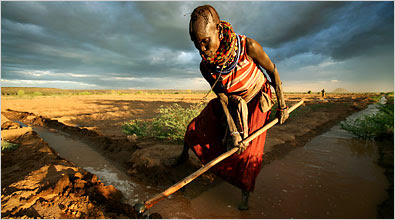Kenya is like South Korea, on the cutting edge of mobile.
Kenya's Startup Boom
the emergence of a tech-savvy generation able to address Kenya’s public-health problems in ways that donors, nongovernmental organizations, and multinational companies alone cannot. ..... a nation where one in 25 is HIV-positive (10 times the U.S. rate) and AIDS, tuberculosis, and malaria are among the leading killers. ..... The health ministry wanted to let community health workers put information into the database directly from mobile phones ..... the Netherlands office of Bharti Airtel, the Indian telecommunications giant that also operates a mobile network in Kenya. The company proposed spending tens of thousands of dollars on mobile phones and SIM cards for the data-gathering task, and it said it would need another $300,000 to develop the data application on the phones. The total package ran to $1.9 million. ...... rounded up the four students. They spent the spring of 2011 at the CHAI offices, receiving internship pay of about $150 a month. They sat for days with the staff in the health ministry to understand the traditional way of gathering information. Then they pounded out the app and polished up the database software to allow disease reporting from any mobile Web interface. By last summer their “Integrated Disease Surveillance and Response” system was up and running at the ministry, obviating much of Bharti Airtel’s proposed costs ...... Mobile phones are lifelines for Kenyans. Some 26 million of the nation’s 41 million people have phones, and 18 million use them to do their everyday banking and conduct other business; most use a service called M-Pesa, which is offered by the country’s dominant wireless provider, Safaricom. If mobile phones could play as big a role in Kenyan health care as they do in Kenyan financial transactions, the effects could be profound...... the U.S. President’s Emergency Plan for AIDS Relief (PEPFAR), which spends $500 million per year in Kenya alone. ...... Sub-Saharan Africa is home to more than two-thirds of the 33 million people estimated to have HIV worldwide. ..... more might get done if local hackers would get together, write more code, and start some companies that had sustainable business models. ..... the country’s first truly mass-market Android smart phone went on sale in 2010, for $80. ..... “We can’t replace the doctors, can’t replace the hospitals, but we can improve access to relevant information.” ....... Soon it will be available through SMS—an essential feature, because 85 percent of Kenyan mobile-phone owners don’t yet have Web access. Kyalo hopes to aggregate other medical apps on the platform and ultimately sell sponsored messages from pharmaceutical companies, health-care providers, and others. ...... “Government is the hardest nut to crack” ..... Safaricom announced that it was launching its own doctor-calling service. In a nation with few doctors and no free 911 service for medical emergencies, residents can now at least speak to a doctor for about 25 cents per minute. ....... She had traveled 50 kilometers to see a specialist for her breast cancer, and now she was alone, exhausted, and at the wrong place on the campus. A pale blue cataract blighted her left eye, and a look of fear and pain shadowed her face as she rested her head against the pillar ...... Last year USAID, a major funder of health projects in Kenya and other developing countries, requested proposals for help creating a unified, Web-based national health information system that would be “host country owned.” The five-year, $32 million contract went to Abt Associates, a consultancy based in Cambridge, Massachusetts, which has done extensive work in global development projects. But although it has expertise, so does the new tech class back in the host country—which also has a long-term stake in the solution and no U.S. overhead. “If you talked about an RFP for $32 million at iHub, people would go nuts! You’d fund 500 startups for that,” CHAI’s Jackson Hungu says. “And this country’s public health delivery would be changed forever. I have no doubt about that.”

